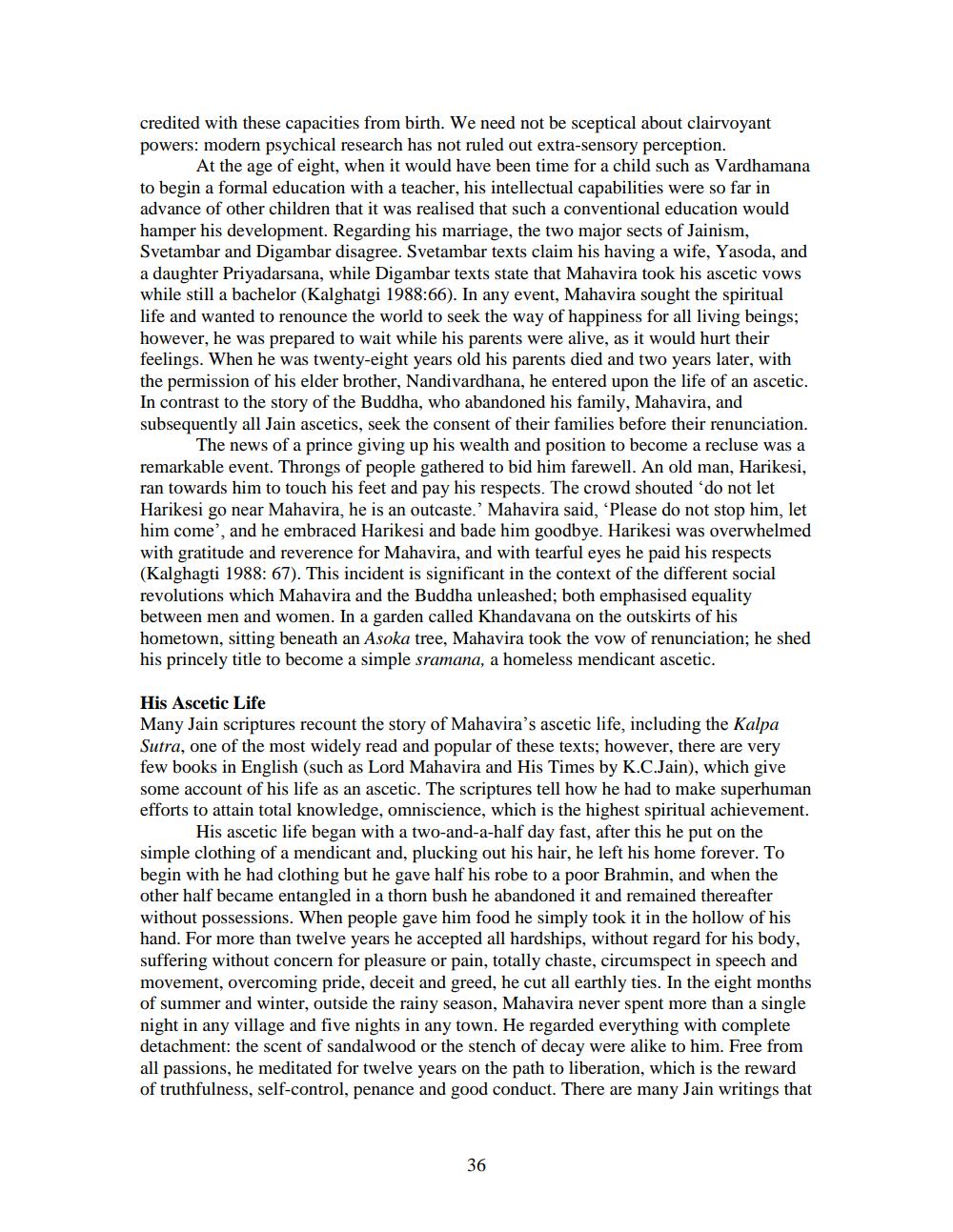________________
credited with these capacities from birth. We need not be sceptical about clairvoyant powers: modern psychical research has not ruled out extra-sensory perception.
At the age of eight, when it would have been time for a child such as Vardhamana to begin a formal education with a teacher, his intellectual capabilities were so far in advance of other children that it was realised that such a conventional education would hamper his development. Regarding his marriage, the two major sects of Jainism, Svetambar and Digambar disagree. Svetambar texts claim his having a wife, Yasoda, and a daughter Priyadarsana, while Digambar texts state that Mahavira took his ascetic vows while still a bachelor (Kalghatgi 1988:66). In any event, Mahavira sought the spiritual life and wanted to renounce the world to seek the way of happiness for all living beings; however, he was prepared to wait while his parents were alive, as it would hurt their feelings. When he was twenty-eight years old his parents died and two years later, with the permission of his elder brother, Nandivardhana, he entered upon the life of an ascetic. In contrast to the story of the Buddha, who abandoned his family, Mahavira, and subsequently all Jain ascetics, seek the consent of their families before their renunciation.
The news of a prince giving up his wealth and position to become a recluse was a remarkable event. Throngs of people gathered to bid him farewell. An old man, Harikesi, ran towards him to touch his feet and pay his respects. The crowd shouted 'do not let Harikesi go near Mahavira, he is an outcaste.' Mahavira said, 'Please do not stop him, let him come, and he embraced Harikesi and bade him goodbye. Harikesi was overwhelmed with gratitude and reverence for Mahavira, and with tearful eyes he paid his respects (Kalghagti 1988: 67). This incident is significant in the context of the different social revolutions which Mahavira and the Buddha unleashed; both emphasised equality between men and women. In a garden called Khandavana on the outskirts of his hometown, sitting beneath an Asoka tree, Mahavira took the vow of renunciation: he shed his princely title to become a simple sramana, a homeless mendicant ascetic.
His Ascetic Life Many Jain scriptures recount the story of Mahavira's ascetic life, including the Kalpa Sutra, one of the most widely read and popular of these texts; however, there are very few books in English (such as Lord Mahavira and His Times by K.C.Jain), which give some account of his life as an ascetic. The scriptures tell how he had to make superhuman efforts to attain total knowledge, omniscience, which is the highest spiritual achievement.
His ascetic life began with a two-and-a-half day fast, after this he put on the simple clothing of a mendicant and, plucking out his hair, he left his home forever. To begin with he had clothing but he gave half his robe to a poor Brahmin, and when the other half became entangled in a thorn bush he abandoned it and remained thereafter without possessions. When people gave him food he simply took it in the hollow of his hand. For more than twelve years he accepted all hardships, without regard for his body, suffering without concern for pleasure or pain, totally chaste, circumspect in speech and movement, overcoming pride, deceit and greed, he cut all earthly ties. In the eight months of summer and winter, outside the rainy season, Mahavira never spent more than a single night in any village and five nights in any town. He regarded everything with complete detachment: the scent of sandalwood or the stench of decay were alike to him. Free from all passions, he meditated for twelve years on the path to liberation, which is the reward of truthfulness, self-control, penance and good conduct. There are many Jain writings that
36




